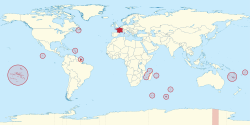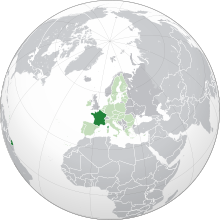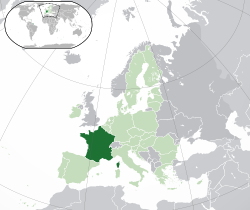
Back Франциа Abkhazian Peurancih ACE Францие ADY Frankryk Afrikaans Frankreich ALS ፈረንሣይ Amharic France AMI Francia AN Francland ANG Furans ANN
French Republic République française (French) | |
|---|---|
| Motto: "Liberté, égalité, fraternité" "Liberty, Equality, Fraternity" | |
| Anthem: "La Marseillaise" | |
Location of metropolitan France (dark green) (Note the overseas department of French Guiana highlighted on the extreme lefthand side of the globe image.)– on the European continent (green & dark grey) | |

| |
| Capital and largest city | Paris 48°51′N 2°21′E / 48.850°N 2.350°E |
| Official language and national language | French[upper-roman 1] |
| Nationality (2018) |
|
| Religion (2017[1]) |
|
| Demonym(s) | French |
| Government | Unitary semi-presidential constitutional republic |
| Emmanuel Macron | |
| François Bayrou | |
| Gérard Larcher | |
| Yaël Braun-Pivet | |
| Legislature | Parliament |
| Senate | |
| National Assembly | |
| Establishment | |
| 25 December 496 | |
| August 843 | |
| 22 September 1792 | |
| 1 January 1958 | |
| 4 October 1958 | |
| Area | |
• Total | 640,679 km2 (247,368 sq mi) |
| 551,695 km2 (213,011 sq mi) | |
• Metropolitan France (Cadastre) | 543,940.9 km2 (210,016.8 sq mi) |
| Population | |
• Feb 2022 estimate | |
• Density | 104/km2 (270/sq mi) (106th) |
• Metropolitan France, estimate as of June 2020 | |
• Density | 116/km2 (300.4/sq mi) (89th) |
| GDP (PPP) | 2019 estimate |
• Total | |
• Per capita | |
| GDP (nominal) | 2019 estimate |
• Total | |
• Per capita | |
| Gini (2018) | low |
| HDI (2018) | very high · 26th |
| Currency |
|
| Time zone | UTC+1 (Central European Time) |
• Summer (DST) | UTC+2 (Central European Summer Time[upper-roman 10]) |
| Note: various other time zones are observed in overseas France.[upper-roman 9]
| |
| Date format | dd/mm/yyyy (AD) |
| Driving side | right |
| Calling code | +33[upper-roman 11] |
| ISO 3166 code | FR |
| Internet TLD | .fr[upper-roman 12] |
Website www | |
Source gives area of metropolitan France as 551,500 km2 (212,900 sq mi) and lists overseas regions separately, whose areas sum to 89,179 km2 (34,432 sq mi). Adding these give the total shown here for the entire French Republic. The World Factbook reports the total as 643,801 km2 (248,573 sq mi).[9] | |
France (![]() /ˈfræns/ (help·info) or /ˈfrɑːns/; French pronunciation: [fʁɑ̃s]), officially the French Republic (French: République française, French pronunciation: [ʁepyblik fʁɑ̃sɛz]), is a country in Western Europe. It also includes various departments and territories of France overseas.
/ˈfræns/ (help·info) or /ˈfrɑːns/; French pronunciation: [fʁɑ̃s]), officially the French Republic (French: République française, French pronunciation: [ʁepyblik fʁɑ̃sɛz]), is a country in Western Europe. It also includes various departments and territories of France overseas.
Mainland France extends from the Mediterranean Sea to the English Channel and the North Sea, and from the Rhine to the Atlantic Ocean. It is sometimes referred to as L’Hexagone ("The Hexagon") because of the shape of its territory.
France is a unitary semi-presidential republic. The head of state is the President, who is also a politician. The Prime Minister is secondary to the President.
Metropolitan France is bordered (clockwise from the North) by Belgium, Luxembourg, Germany, Switzerland, Italy, Monaco, Andorra, and Spain. The overseas departments and collectives of France share land borders with Brazil and Suriname (bordering French Guiana), and the Netherlands Antilles (bordering Saint Martin). France is linked to the United Kingdom by the Channel Tunnel, which passes under the English Channel.
France is the largest country in the European Union and the second largest in Europe. It has been one of the world's most powerful countries for many centuries. During the 17th and 18th centuries, France colonized much of North America. During the 19th and early 20th centuries, France built one of the largest colonial empires of the time. This included large parts of North, West and Central Africa, Southeast Asia, and many Pacific Islands. France is a developed country and has a large economy.[10]
It is the most visited country in the world, with 82 million foreign visitors every year.[11]
France was one of the first members of the European Union, and has the largest land area of all members. It is also a founding member of the United Nations, and a member of the Francophonie, the G8, NATO, and the Latin Union. It is one of the five permanent members of the United Nations Security Council. France has the largest number of nuclear weapons with active warheads, and the largest number of nuclear power plants, in the European Union.
France's official language is French, which is also official in 29 other countries. Some other French speaking countries include the Congo, Algeria, and Mauritius.
Cite error: There are <ref group=upper-roman> tags on this page, but the references will not show without a {{reflist|group=upper-roman}} template (see the help page).
- ↑ "Sondage 'Les protestants en France en 2017' (1) : qui sont les protestants ?". Reforme.net (in French). 26 October 2017. Archived from the original on 19 October 2017. Retrieved 12 April 2019.
- ↑ "Table 3: Population by sex, rate of population increase, surface area and density" (PDF). Demographic Yearbook. United Nations Statistics Division. 2012. Archived from the original on 28 April 2015. Retrieved 4 September 2017.
- ↑ "France Métropolitaine". INSEE. 2011. Archived from the original on 28 August 2015.
- ↑ "Demography – Population at the beginning of the month – France". Insee. 2019. Archived from the original on 25 February 2021. Retrieved 31 July 2019.
- ↑ "Demography – Population at the beginning of the month – Metropolitan France". Insee. 2019. Archived from the original on 6 June 2019. Retrieved 31 July 2019.
- ↑ 6.0 6.1 6.2 6.3 "World Economic Outlook Database, October 2019". IMF.org. International Monetary Fund. Archived from the original on 22 May 2020. Retrieved 30 October 2019.
- ↑ "Gini coefficient of equivalised disposable income – EU-SILC survey". ec.europa.eu/eurostat. Eurostat. Archived from the original on 20 March 2019. Retrieved 15 October 2019.
- ↑ "Human Development Report 2019" (PDF). United Nations Development Programme. 10 December 2019. Archived from the original (PDF) on 22 March 2017. Retrieved 10 December 2019.
- ↑ "Field Listing :: Area". The World Factbook. CIA. Archived from the original on 31 January 2014. Retrieved 1 November 2015.
 This article incorporates text from this source, which is in the public domain.
This article incorporates text from this source, which is in the public domain.
- ↑ Field listing - GDP (official exchange rate) Archived 4 October 2008 at the Wayback Machine, CIA World Factbook: List of countries by nominal GDP figures.
- ↑ "Le tourisme international en France en 2007" (PDF). Direction du Tourisme (French government's tourism agency). Archived from the original (PDF) on 24 June 2008. Retrieved 5 June 2008. (in French)



